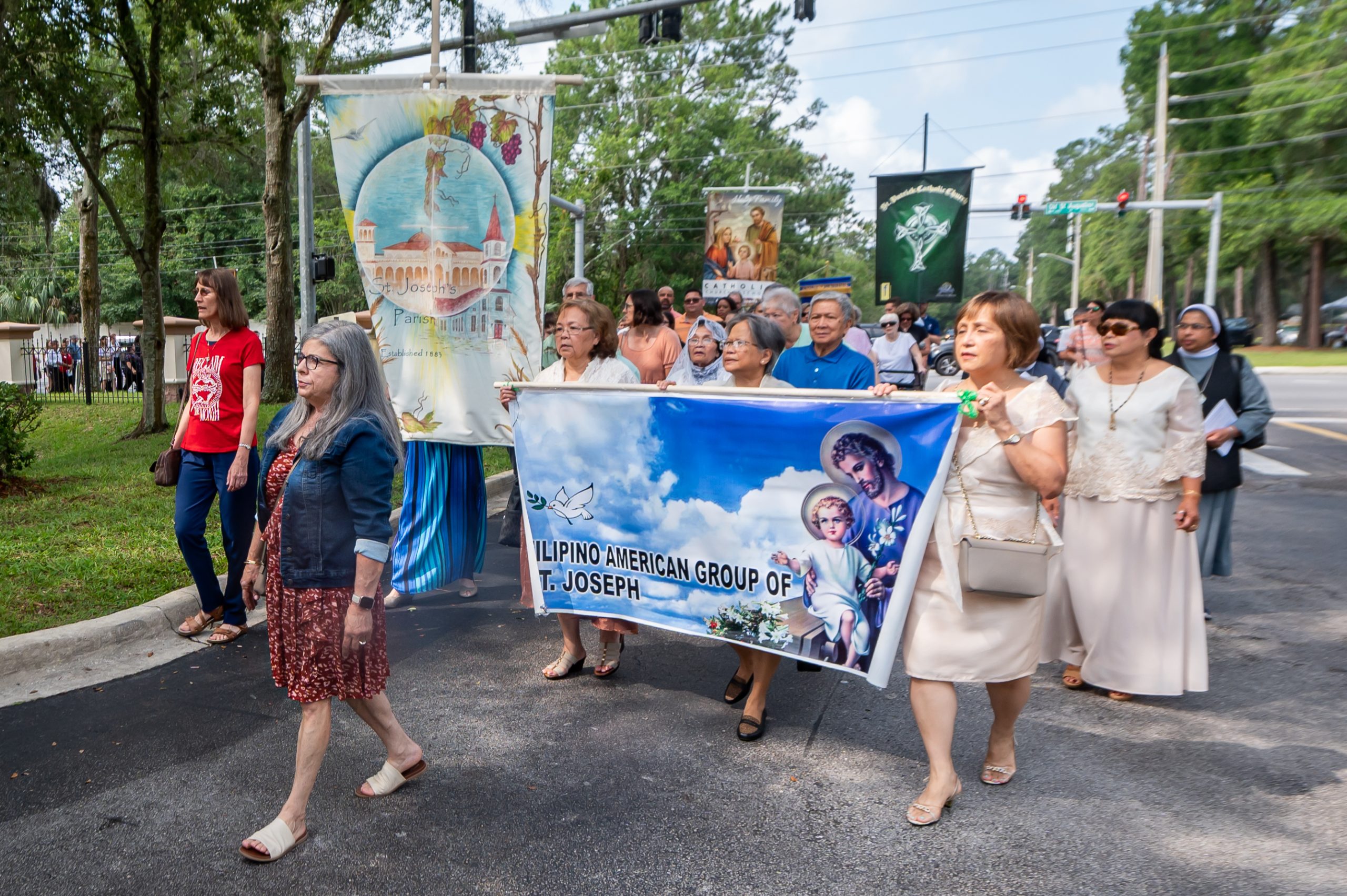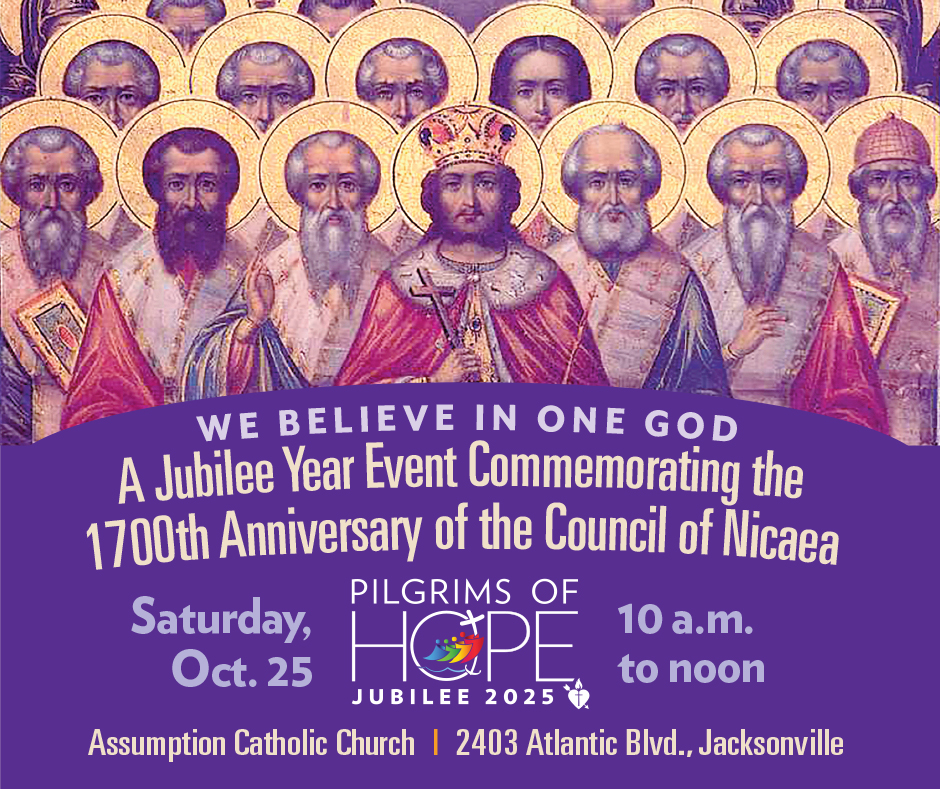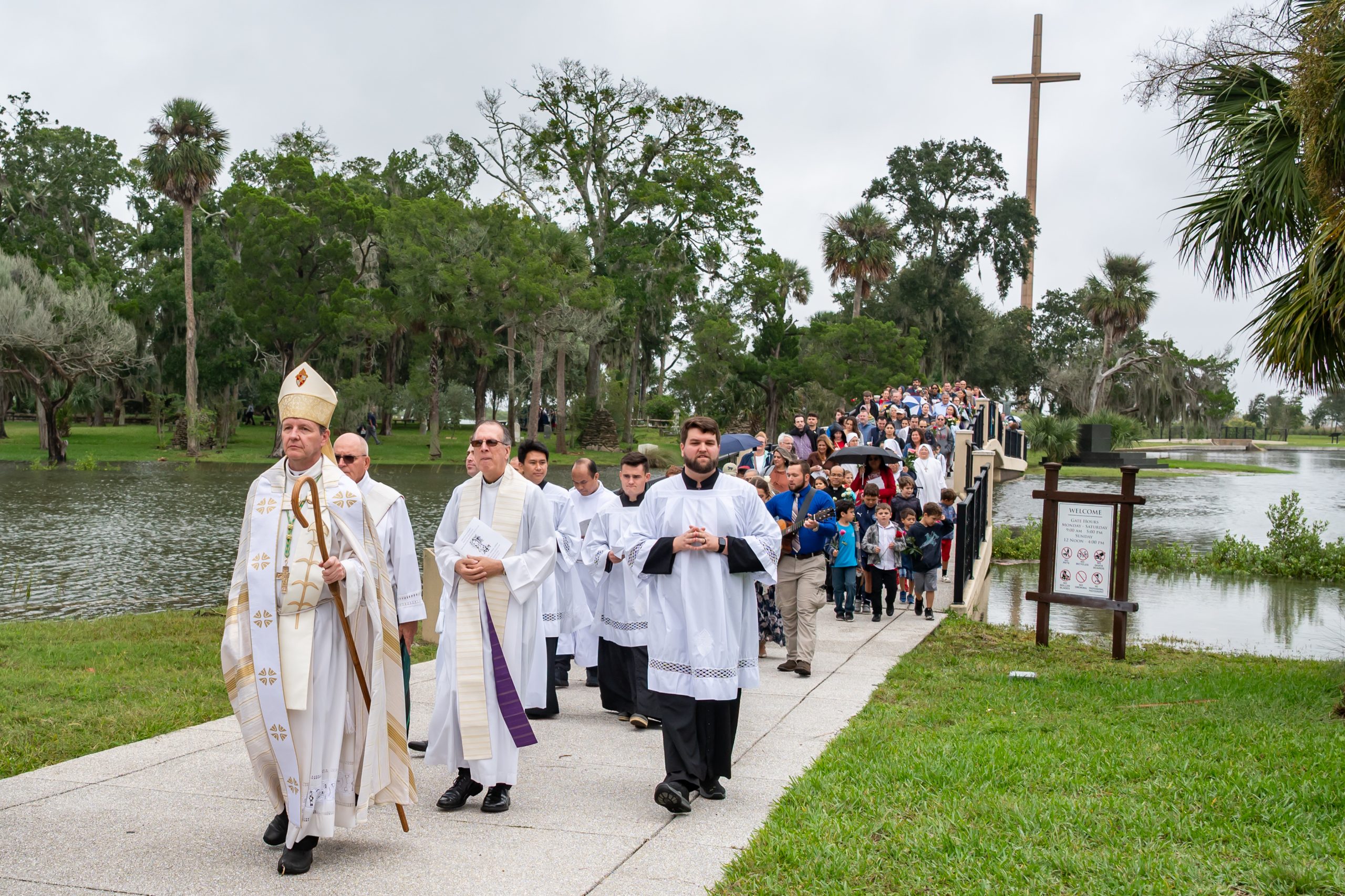By Jean Gonzalez
While an annual three-day festival was slated for Feb. 25-27 at St. Mary Protectress Ukrainian Catholic Church in Apopka, it was canceled.
Instead, the church served host for rallies to support one another, pray in solidarity and sing songs from their homeland. Father Roman Kuzminskyi, pastor of St. Mary Protectress, said the morning of Feb. 25, parishioners began coming to the church, so he celebrated a Mass that evening.
“Our church is open all day, and a lot of people are coming to pray,” he said, adding those participating were Ukrainians and Americans.

Father Kuzminskyi is from Ivano-Frankivsk, located in western Ukraine, some 500 miles from Kyiv. Although his parents are in the United States, his childhood home is still in Ivano-Frankivsk. The day the war began, his friends went to bunkers, but before they did, they snapped some photos of the view from his parent’s house.
Because his friends and relatives are in hiding, the priest does not have contact with them. “All I know is what I see on television and the internet.”
So, just as community members find comfort in one another, so does Father Kuzminskyi. He recently expanded his ministry to serve Ukrainians north of Apopka. Starting Jan. 5, the priest travels to San Sebastian Parish in St. Augustine to preside at a twice-a-month Mass in Ukrainian for those who wish to celebrate in their native language. Although he said the community is small, with about 30 people attending Mass, on Feb. 26, some 60 people gathered in the church.
“One word can help – faith,” Father Kuzminskyi said. “If we don’t have faith, we can do nothing. Just our faith, just our prayers, can help now. Prayers and faith are all we have.”
Faith, solidarity, support – were some of the reasons Ulana Liuzan attended Mass at Epiphany Ukrainian Catholic Church in St. Petersburg. The 36-year-old grew up in Lviv, the largest city in western Ukraine and less than 45 miles from the Polish border. With grandparents, uncles and cousins still in Ukraine, she was grateful the borders of Poland were open. Some family members have already left Ukraine for the border.
But others stayed to fight, despite not having any military background and having no weapons against a heavily armed Russian military. She said a key to understanding the vulnerability of Ukraine in this conflict is the Minsk Agreement, which was implemented in 2015 to promote a cease-fire between Ukraine and Russia. It included many provisions, including the withdrawal of heavy weapons by both sides. Ukraine did so; Russia did not. “Ukraine gave up nuclear power, but then Russia didn’t respect the borders.”

As Liuzan speaks just outside the church, behind her flags of Ukraine wave in the breeze. So does a flag similar to the national flag, but instead of single stripes of blue and yellow, it contains stripes of black and red.
“That is the flag of the underground resistance,” Liuzan explained.
She recognized the flag because her own grandfather was part of the underground before Ukraine became sovereign in 1991. And that brought up the “scary part” of this conflict. Liuzan said in Ukraine’s centuries-old history, it has suffered numerous times to secure its freedom. But the horrors of the Gulag (which her grandfather had personally known) are a part of its modern history. And it is something Ukrainians never want to experience or should experience again.
“We watched what happened with Georgia, and thought, ‘That won’t happen to us,” she said, referring to when, in 2008, Russia launched a full-scale land, air and sea invasion of Georgia, which Russia called a “peace enforcement” operation, but the world referred to as the Russo-Georgian War. “We know what can happen here. (Putin) wants to go further.”
When asked if she would like to go on camera to offer a message about the conflict or her homeland, Liuzan declined, saying it was too difficult. Her emotions were too raw.
But some 15 minutes later, she said she would like to offer a message.
“I want to thank everyone who has supported Ukraine in any way that they can, and if you guys could continue to support Ukraine and please reach out to your senators, to your representatives that you stand with Ukraine. And understand this is happening to Ukrainians right now, but this is Putin, and you could be next. Please help in any way you can. There are lots of ways to donate. Thank you.”
Along with churches in Apopka, St. Augustine, and St. Petersburg, Assumption of the Blessed Virgin Mary Ukrainian Catholic Church serves the Miami community and St. Mary Ukrainian Catholic Church in North Port on the Gulf Coast. On Feb. 27, a rally was held at Assumption to show support and solidarity for Ukraine. Participants were asked to wear embroidered shirts, bring Ukrainian flags, and prepare banners, slogans in support of Ukraine.

Both the North Port and St. Petersburg churches hosted a fundraising concert by TRIODA by Revived Soldiers Ukraine, a nonprofit based in Orlando that funds the purchase of medicines and medical equipment for military hospitals in Ukraine. As of Feb. 28, $218,000 of its $300,000 goal was made.
The doors of Ukrainian churches in Florida and across the world are open for prayer, and many nights host evening prayer during the week along with its Divine Liturgy on Sundays. Each day, St. Mary’s Facebook page offers a recorded message from its patriarch, Major Archbishop Sviatoslav Shevchuk of Kyiv-Halych, who has stayed in Kyiv during the fighting. On Feb. 28, he said, while the horrors of war continue, the Ukrainian people are standing in prayer for “the military, for our homeland, for our long-suffering Ukrainian people.” He added according to the United Nations; there are already 400,000 refugees from Ukraine after only five days of the war. But he prays that “dialogue and diplomacy conquer war.”
“Today we are experiencing the fifth day of a crooked, inhumane, vicious war. These days we saw the heroism of our soldiers. We saw the courage of our people. We saw how even elderly people laid down before tanks to prevent them from entering their village and city,” the archbishop said. “Today, in many of our communities who follow the Gregorian calendar, it is the first day of Great Lent. I can promise you that this Lent will be very special for you because we are walking together to Pascha – Easter. There will be a Pascha, for our Pascha is our Lord the risen Jesus Christ.”
Jean Gonzales writes for the Florida Catholic and contributes to the St. Augustine magazine.







